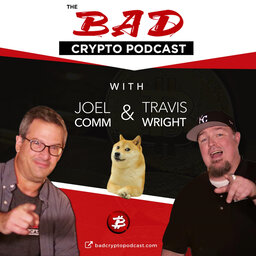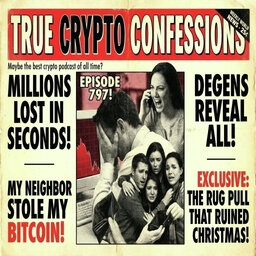The Future of Bitcoin ETFs with Patrick Daugherty
With Bitcoin ETFs now active, you might be feeling slightly sheepish to ask what exactly is a Bitcoin ETF? No need for you to feel sheepish.
We’re going to ask the question for you as we welcome Patrick Doherty to the show. A teacher of digital assets at Cornell Law School, Mr. Daugherty has contributed several books on securities regulation and new financial products. He was with the SEC during the Regan Bush years and helped craft regulations, which are used today to sell tokens and compliance with US securities law.
Asking questions sheepishly doesn’t make you a sheep, just an inquisitive person. So join the herd at the Republic of Bad Cryptopia as we discover everything you wanted to know about Bitcoin ETFs, but we’re afraid to ask on episode number 710 of the Bad Crypto Podcast.
Full Show Notes at: http://badco.in/710
SUBSCRIBE, RATE, & REVIEW:
Apple Podcast: http://badco.in/itunes
Google Podcasts: http://badco.in/google
Spotify: http://badco.in/spotify
Amazon Music: http://badco.in/amazon
FREE NFTs when you JOIN THE BAD CRYPTO NIFTY CLUB at https://badcrypto.uncut.network
FOLLOW US ON SOCIAL MEDIA:
Twitter: @badcryptopod - @joelcomm - @teedubya
Facebook: /BadCrypto - /JoelComm - /teedubyaw
Facebook Mastermind Group: /BadCrypto
LinkedIn: /in/joelcomm - /in/teedubya
Instagram: @BadCryptoPodcast
Email: badcryptopodcast[at]gmail[dot]com
Phone: SEVEN-OH-8-88FIVE- 90THIRTY
DISCLAIMER:
Do your own due diligence and research. Joel Comm and Travis Wright are NOT FINANCIAL ADVISORS. We are sharing our journey with you as we learn more about this crazy little thing called cryptocurrency. We make NO RECOMMENDATIONS. Don't take anything we say as gospel. Do not come to our homes with pitchforks because you lost money by listening to us.
We only share with you what we are learning and what we are investing it. We will never "pump or dump" any cryptocurrencies. Take what we say with a grain of salt. You must research this stuff on your own! Just know that we will always strive for RADICAL TRANSPARENCY with any show associations.
 The Bad Crypto Podcast
The Bad Crypto Podcast


